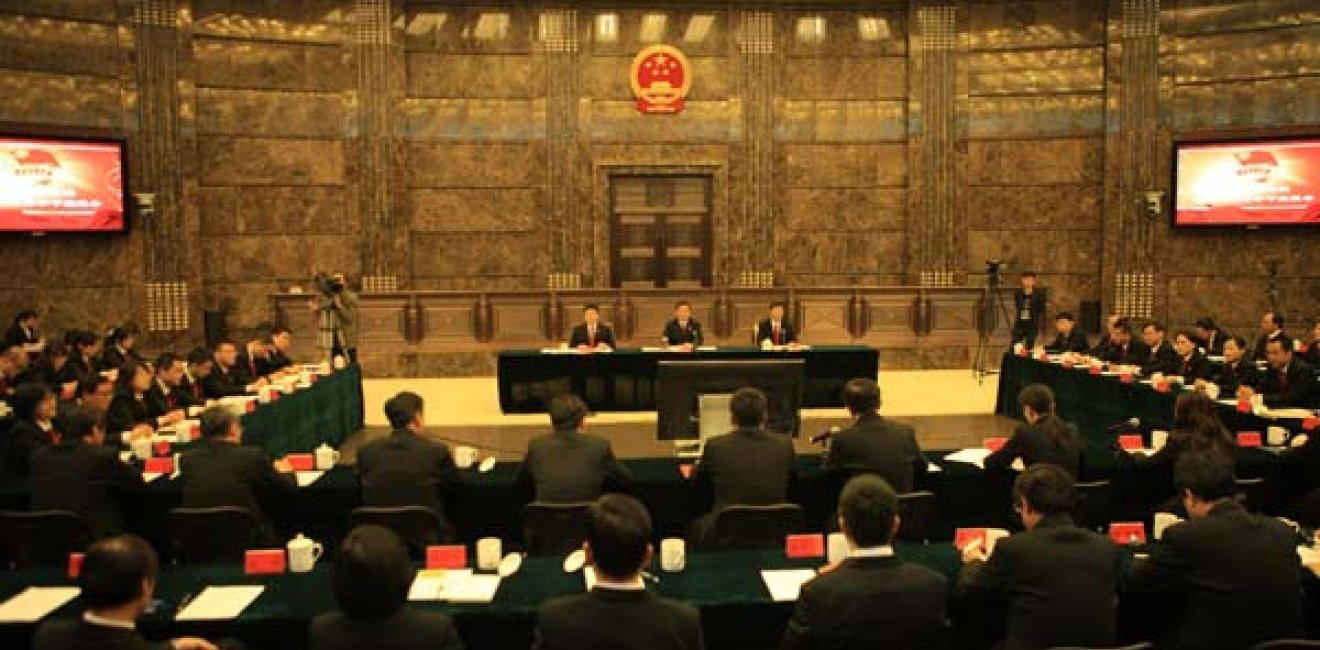China’s Freedom of Information Act Turns Eight
Scholar Jamie Horsley summarizes the impact, influence and challenges of China's Open Government Information Regulation within its first eight years.
Scholar Jamie Horsley summarizes the impact, influence and challenges of China's Open Government Information Regulation within its first eight years.

May 1 marks the eighth anniversary of China’s first nationwide government records access statute, the State Council Regulations on Open Government Information (“OGI”). Adopted in 2007 and implemented since May 1, 2008 after a year of preparation, the right to request and obtain government-held information under the OGI Regulations spawned an outburst of civic activism. The State Council, often together with the Chinese Communist Party Central Committee, has continued year-by-year to reaffirm a commitment to gradually expand the scope of government transparency that reinforced concurrent moves toward greater openness in people’s congress lawmaking, judicial decision-making and even, to some extent, of Chinese Communist Party affairs.[1]
As May approaches, revision of the OGI Regulations is at the top of the State Council’s 2016 legislative plan. A 78-year old man in Anhui province is awaiting a court decision on his appeal from denial on state secrets grounds for access to the 20-year old criminal case file on his erroneous detention for alleged murder, during which he claims he was tortured. Three Beijing residents are awaiting decisions on two court cases seeking documents from the Ministry of Agriculture on the safety of Monsanto’s herbicide Roundup, which requests were denied on commercial secrets grounds. And a Jiangxi province state-owned solar energy company is suing the Ministry of Finance for information concerning fraud allegations about NYSE-listed competitor Jiangxi Jinko Solar Holding Co Ltd, which the ministry refused to disclose on commercial secrets grounds.
Under the proactive disclosure mandate of the OGI Regulations, government agencies at all levels have been releasing some 30 to 40 million records annually, while dealing with increasing numbers of information requests from the public. Annual OGI work reports posted online as of the statutory deadline of March 31, 2016 by 57 central government departments recorded a total of nearly 150,000 information requests filed in 2015, a sharp increase from the 3,000 recorded for the central government in 2011, although the bulk – some 132,000 – were reported by just one ministry, the Ministry of Information Technology. For a country the size of China, this seems like a small number. By way of comparison, 713,000 Freedom of Information requests were filed across the U.S. federal government in FY 2015.[2] Still, over half of China’s central government departments saw an increase in the number of OGI requests in 2015, and requests more than doubled at 13 departments.[3]
Data on the number of requests filed at the provincial and lower levels of government, reportedly around 1.3 million in 2011, is more difficult to ascertain, since the required annual reports filed by some provincial governments such as Shanghai incorporate the numbers from the county level governments and departments, while others only include the provincial-level government itself. A total of 433,000 requests are reported for 2015 by 30 provincial-level governments, excluding Xinjiang,[4] and spot comparisons with prior years as well as anecdotal evidence indicate that Chinese citizens are actively using the OGI Regulations to seek information from local governments in increasing numbers.
The OGI annual and other reports indicate that requested information is being disclosed at rates of over 60 percent. These statistics are difficult to confirm, as is the satisfaction of requesters with the information they are given. What is clear, however, is that dissatisfied Chinese requesters have been actively pursuing their legal remedies to obtain government information in the face of government denials since day one.
This trend seems borne out by the increase in the number of OGI-related administrative appeals and lawsuits being filed by requesters. China’s Supreme People’s Court reported that, from 2011 to 2014, courts throughout China received a total of roughly 30,000 OGI cases of first instance,[5] with 5,000 OGI cases filed across the country in 2013 alone. The number of OGI lawsuits has more than tripled in 2015, according to those central and provincial government reports for last year, to roughly 16,000 lawsuits, as well as 22,000 administrative appeals, over OGI issues. While the government continues to win the vast majority of these appeals and cases, plaintiff victories are inching up in some places. For example, the provincial-level port city of Tianjin reported that, while plaintiffs on average prevailed in only 7 percent of lawsuits against government in 2014, the success rate was nearly 15 percent in OGI cases, and a Guangdong provincial court reported plaintiff success rates rose from 10 percent in 2013 to 12 percent in 2014. In 2015, the Beijing fourth intermediate cross-district court, created to handle sensitive lawsuits including those against government defendants throughout the nation’s capital, reported that OGI cases constituted over half of government-related litigation and resulted in a 25 percent plaintiff victory rate.
Soon after the OGI Regulations took effect, Chinese courts began tentatively to entertain some OGI lawsuits, particularly when they were brought to enforce the 15 business day deadline for responding to requests. The courts would find the government in violation of the Regulations, make it pay the modest court fees and then send the case back to the defendant for a response, without reaching the substance of the disclosure request. Faced with the real prospect of ending up and losing in court, these rulings, combined with increasing requirements from the State Council to take OGI work seriously, helped encourage governments to engage with and respond to requesters rather than ignore them. After the SPC issued a judicial interpretation in 2011 guiding courts on handling OGI cases, more courts began to also order disclosure. A landmark 2012 decision that ordered disclosure by a local environmental protection bureau of waste water discharge information to be used in support of a civil pollution compensation lawsuit also recognized that filing OGI requests as a discovery tool to obtain information from the government for use in civil lawsuits, such as to obtain compensation for environmental pollution or land takings, is a valid use of the Regulations.
Over the past eight years, the Chinese public’s active use of the OGI Regulations has also helped to expand the boundaries of what is recognized as public information and chipped away at the edifice of state secrecy. Budget and government financial information, environmental discharge data, sensitive investigative reports on soil pollution, food safety and counterfeit goods, government decisions to impose penalties and fines on companies and individuals, senior official job descriptions and the number of official personnel on an agency payroll (if not yet their salaries), which were formerly protected as state or commercial secrets, are now accessible under the OGI Regulations. To be sure, the state secrets defense remains a daunting barrier to disclosure, but Chinese citizens continue to push back, sometimes successfully and more typically not, as in the case Beijing lawyer Xie Yanyi’s 2014 request to the Public Security Ministry for information on its surveillance of Chinese citizens in the wake of the Snowden scandal[6] and 82-year old veteran Beijing activist Wang Xiuying’s lawsuit against the Finance Ministry in 2013 seeking the amount of aid China provides to North Korea.
Indeed, Chinese activists use OGI requests to publicize issues as well as obtain information, claiming partial success even if their requests do not get satisfied. Recently, gay rights advocates used OGI requests to obtain and challenge in court a government agency’s reasons for denying an application to establish a rights advocacy organization[7] and for taking down an online documentary about the relationship between gay youths and their mothers,[8] both of which cases stimulated online discussion as well as media coverage. Nine lawyers filed an OGI request to seek the legal basis for, and bring public attention to, the Minister of Education’s call in 2015 to tighten ideological control in the classroom and forbidding discussion of Western values or criticism of socialism or the Party’s leaders.[9] And nine women in March 2016 sent OGI requests to 112 universities throughout the country for information on their policies to address sexist on-campus job recruitment practices, to raise public awareness of this continuing problem for female graduates.[10]
On its part, the State Council continues to reaffirm its commitment to increasing government transparency and open government more generally, most recently in its 2016 Open Government Work Priorities published April 18 and addressed to the central government departments and provincial-level governments.[11] Building on OGI work priorities issued since 2012, the 2016 Priorities emphasize disclosure in key areas of public concern, including environmental protection, budgets and government expenditures, food and drug safety and affordable housing, as well as transparency of state-owned enterprise affairs and their executives’ salaries. However, they explicitly expand their scope beyond a records access focus under the OGI Regulations to broader issues such as promoting public participation in government rulemaking and decision-making, experimenting with open government meetings and improving systems to provide explanations of and feedback on public comments concerning government actions, under the rubric of “open government,” which was the topic of joint Party Central Committee and State Council guidance issued in February 2016. [12] Greater transparency is called for in reform initiatives, assisting economic growth, improving the people’ livelihood, promoting more effective government, and increasing public understanding and support.
In spite of continued top-down emphasis on and bottom-up demand for government transparency that is propelling gradual progress, compliance with the OGI Regulations’ mandate for government agencies at all levels proactively to disclose a wide range of information and to provide information on the request of Chinese citizens remains uneven. Third party assessments, another emphasis of the 2016 Priorities, conducted by the Chinese Academy of Social Sciences and “watchdog” organization like Peking University’s OGI Watch project, report that compliance, while improving at the top, becomes more problematic at the lower levels of government. The 2016 Priorities call for trainings of all open government staff within a three-year period pursuant to a training plan, for government leaders at all levels to listen to at least one report on open government work during the year, and for including such work in any government official performance evaluation systems that do not already assess it, with a weight of at least four percent. This document also requires governments and departments to post online their plans or measures for carrying out the Priorities within 30 business days. The State Council will enlist a third party assessor to conduct an evaluation and publish its findings.
Government officials tasked with carrying out the disclosure mandate, judges, academics, lawyers and citizen users all call for greater clarity about what information should be disclosed and what should be withheld, prompting the State Council to propose developing a “negative list” of information that cannot be disclosed. All information not covered by the list would be presumed to be publicly available.[13] The 2016 Priorities call for conducting OGI negative list experiments in selected localities and departments. However, the age-old tension between openness and secrecy is reflected in the side-by-side mandates requiring periodic reviews of non-public government records to ensure that all information that should be disclosed is being disclosed, while strictly conducting secrecy examinations of all information that it being proposed to be disclosed.
Some Chinese scholars are confident that the contemplated revision of the OGI Regulations, also mentioned in the 2016 Priorities, will both clarify the exemptions from disclosure under the principle of “disclosure is the norm, non-disclosure the exception,” perhaps requiring development of non-disclosure negative lists, and liberalize the requirements for filing OGI requests. On the other hand, with the number of OGI requests and litigation rising annually, some Chinese officials and judges are complaining about frequent and burdensome requesters, as well as some who seem more intent on harassing government than truly interested in obtaining the requested information. Some even call OGI the new xinfang, or petitioning channel, since citizens know they will get a response from and possibly an opportunity to talk with the government concerning their inquiry.
In March 2015, a court in Nantong, Jiangsu province startled the Chinese legal community with a decision to throw a plaintiff out of court for “abusing” his right to information through repetitive and baseless requests and his right to use judicial resources to sue the government.[14] The plaintiff in that case, together with his daughter and his sister-in-law, had filed 94 OGI requests, 39 administrative appeals and 36 lawsuits since 2013 seeking information allegedly relating to legal authorization and compensation for the family’s loss of their homes through expropriation for separate development projects in 2007 and 2012, respectively. Nantong had reported an increase in OGI requests of over 600 percent from 789 applications in 2012 to 5,200 in 2014.[15] The court’s discussion of the challenges of frequent requesters and litigators faced by resource-strapped government bureaucracies and courts seems to have resonated with the Supreme People’s Court, which made the decision a “model case.”
At least one additional OGI abuse case has been reported. There, the court in Danyang, Zhenjiang Municipality in Jiangsu province dismissed a lawsuit brought by a requester seeking a project feasibility study approval the government said did not exist, finding that requesting information the plaintiff apparently had already obtained in 2010 was a “malicious” act motivated by a desire to express dissatisfaction with the approval and interfere with the government’s daily work, rather than to obtain information. Such malicious requests, held the court, violate the intent of and are not protected under the OGI Regulations.[16]
Documents such as the State Council 2016 Open Government Work Priorities are important indicators of continued leadership attention to and emphasis on this work. The specific tasks assigned and reporting required are intended to incentivize all leading government officials, at all levels, to take them seriously. China has come a long way on its surprising and rocky road toward establishing a more open governance system for its people, thanks to a dynamic interaction between top-down policy and bottom-up demand. As the OGI Regulations enter their ninth year of implementation and face their first statutory overhaul in an extremely complex and evolving environment, realizing a “right to information” and open government more broadly will remain a challenging endeavor.
This article was originally published at FreedomInfo
[1] See, Jamie P. Horsley, “China’s Leaders Endorse Disclosure as the `Norm,’ Freedominfo.org, November 4, 2014, at: http://www.freedominfo.org/2014/11/chinas-leaders-endorse-disclosure-norm.
[2]U.S. Department of Justice, What is FOIA? Website, FOIA Data at a Glance FY2010-FY2015, at: http://www.foia.gov/index.html.
[3]“Annual OGI Reports of 19 Departments including Ministry of Supervision and Legislative Affairs Office Not Comliant” [Jianchabu fazhiban deng 19 bumen xinxi gongkai baogao bu hege], Caixin Online, April 12, 2016, at: http://china.caixin.com/2016-04-12/100930992.html.
[4] Annual Reports on Open Government Information Work for the 2015 Year Published by the State Council Departments and Provincial (District, Municipal) Governments [Guowuyuan youguan bumen he sheng (qu/shi) zhengfu gongbu de 2015 nian zhengfu xinxi gogkai gongzuo niandu baogao] , at: http://www.gov.cn/zhuanti/2015zfxinxigongkaibaogao/index.htm .
[5] Li Song, 政府信息公开待补“法律短板”[Open Government Information is Completing Legal Shortcomings], Liaowang Weekly, Issue 3, January 16, 2016, at: http://blog.sina.com.cn/s/blog_55fda6350102w34j.html (accessed March 19, 2016); 最高人民法院关于行政审判工作情况的报告 [Supreme People’s Court Report on Administrative Adjudication Work], November 2, 2015, at: http://www.npc.gov.cn/npc/xinwen/2015-11/03/content_1949926.htm .
[6] Didi Kirsten Tatlow, “Pushing Back Against Government Surveillance,” New York Times, February 19, 2016, at: http://sinosphere.blogs.nytimes.com/2014/02/19/pushing-back-against-surveillance/?_r=0&mtrref=undefined&gwh=51CC70F5D7C5BB4FC493C137CEA2CB9A&gwt=pay.
[7]Frank Zhao, “Gay Rights Activist Sues after NGO Request Denied,” China Daily, February 2014, at: http://www.chinadaily.com.cn/china/2014-02/21/content_17295546.htm ; Dong Le, “China’s Xiang Xiaohan: First gay man to sue the government,” BBC Chinese Service, March 27, 2014, at: http://www.bbc.com/news/world-asia-china-26631161.
[8]Lilian Lin, “Chinese Gay Activist Claims Victory in Online Film Censorship Lawsuit,” Wall Street Journal China Real Time, December 28, 2015, at: http://blogs.wsj.com/chinarealtime/2015/12/28/chinese-gay-activist-claims-victory-in-online-film-censorship-lawsuit.
[9] Donald Clarke, “Chinese lawyers file freedom of information request for legal basis for ban on teaching ‘Western Values,’ February 21, 2015, at: http://lawprofessors.typepad.com/china_law_prof_blog/2015/02/chinese-lawyers-file-freedom-of-information-request-for-legal-basis-for-ban-on-teaching-of-western-v.html; Chinese Law Prof Blog on article at: http://blog.feichangdao.com/2015/02/nine-lawyers-file-foia-request.html.
[10]Xin Lin and Yang Fan, “Chinese Activists Probe Colleges Over Sexist Job Adverts,” Radio Free Asia, March 31, 2016, at: http://www.rfa.org/english/news/china/chinese-activists-probe-colleges-over-sexist-job-adverts-03312016102205.html.
[11] “Efforts to increase government transparency,” English.gov.cn, April 18, 2016, at: http://english.gov.cn/policies/latest_releases/2016/04/18/content_281475330329712.htm; Chinese text of the State Council General Office Open Government Affairs Work Priorities for 2016 [2016 nian zhengwu gongkai gongzuo yaodian], at: http://www.gov.cn/zhengce/content/2016-04/18/content_5065392.htm.
[12] See, also, Jamie P. Horsley, “China Promotes Open Government as its Seeks to Reinvent its Governance Model,” Freedominfo.org, February 22, 2016, at: http://www.freedominfo.org/2016/02/china-promotes-open-government-as-it-seeks-to-reinvent-its-governance-model/.
[13] See, also, Jamie P. Horsley, “China Promotes Open Government as its Seeks to Reinvent its Governance Model,” Freedominfo.org, February 22, 2016, at: http://www.freedominfo.org/2016/02/china-promotes-open-government-as-it-seeks-to-reinvent-its-governance-model/ .
[14] Lu Hongxia v. Nantong Municipal Commission of Development and Reform , Supreme People’s Gazette 2015, Issue 11.
[15] Yuen Yeuk-laam, “Court claims family’s requests for government information is abuse of right,” Global Times, March 16, 2015, at: http://www.globaltimes.cn/content/912281.shtml.
[16] “Danyang decides a case on misuse of right to access government information” [Danyang xuanpan yiqi lanyong zhengfu xinxi gongkai shenqingquan an] , Yangzi Evening News, April 15, 2016, at: http://www.yangtse.com/jiangsu/2016/04/15/845264.html .


The Kissinger Institute works to ensure that China policy serves American long-term interests and is founded in understanding of historical and cultural factors in bilateral relations and in accurate assessment of the aspirations of China’s government and people. Read more


